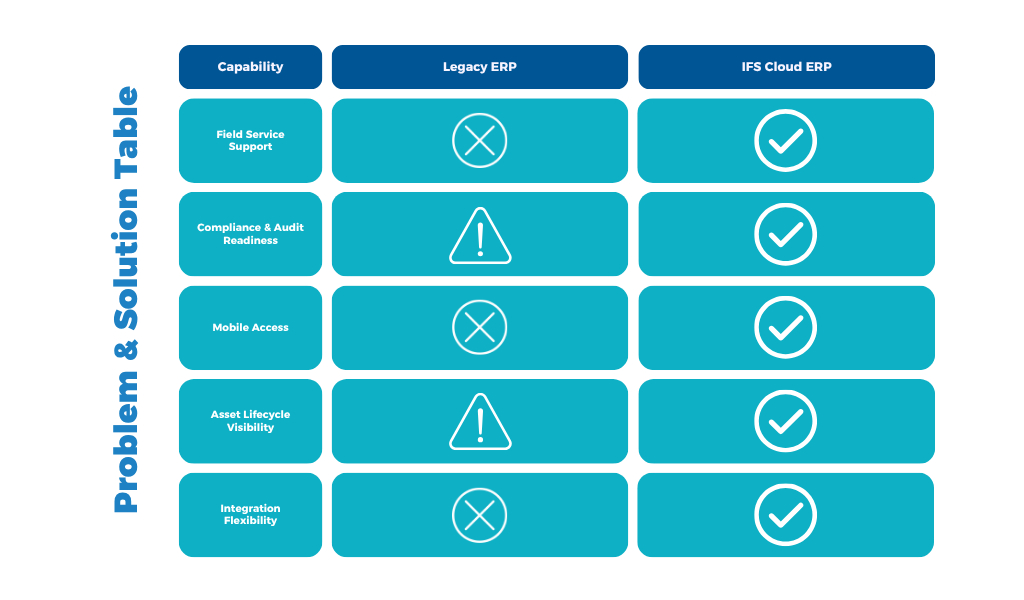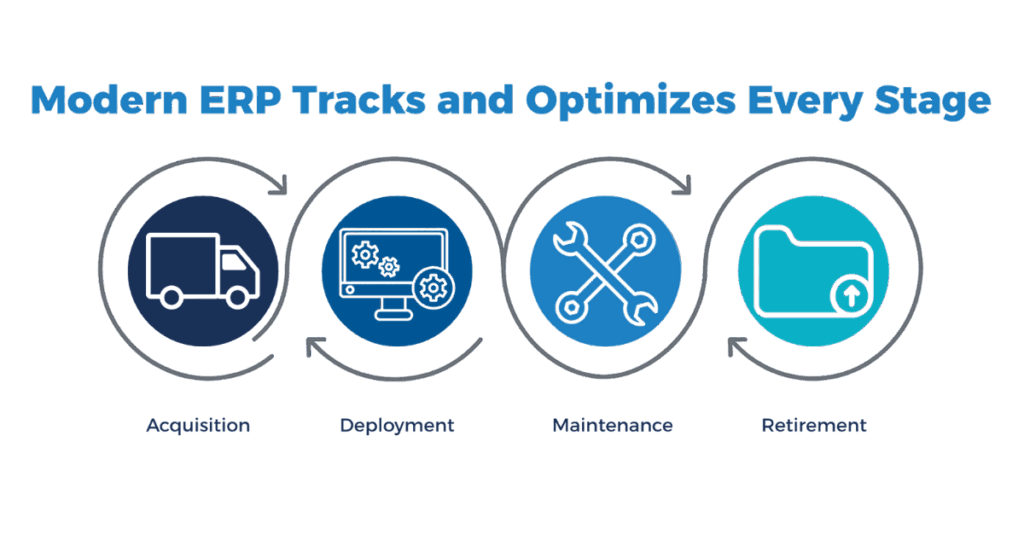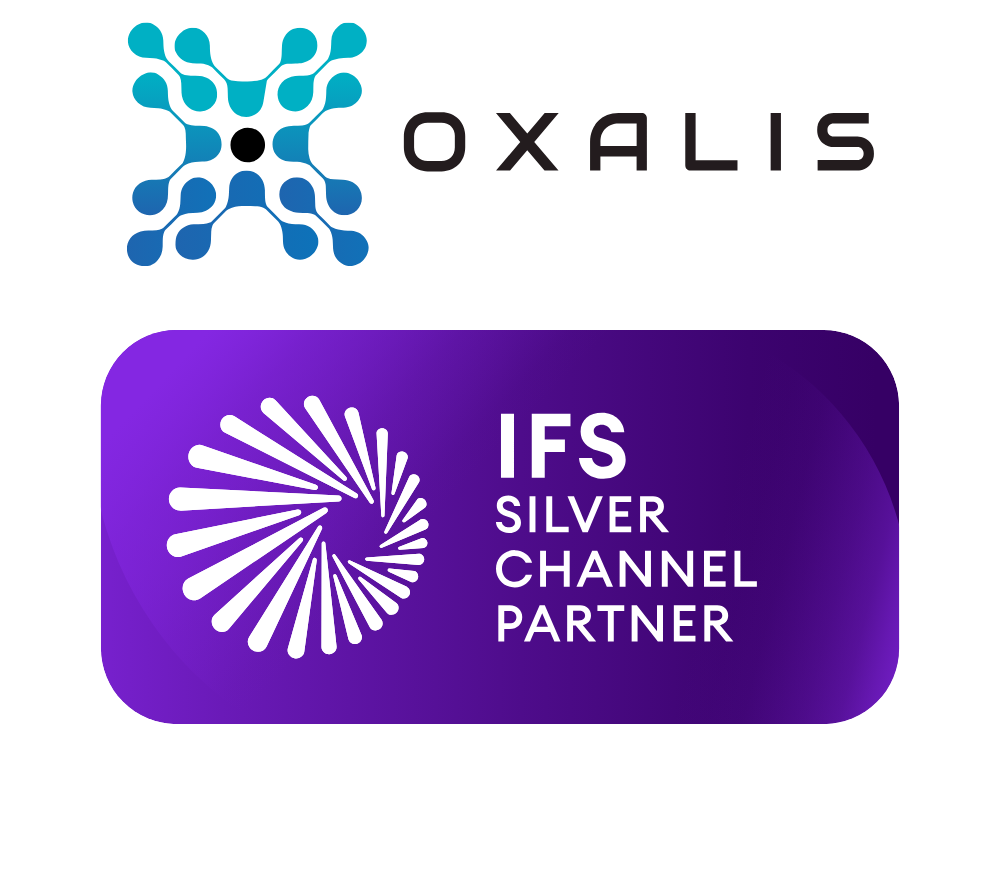At-a-Glance: Legacy ERP systems like SAP ECC, R/3, Oracle EBS, and JD Edwards weren’t built for today’s mission-driven, asset-intensive operations. Modern ERP platforms like IFS Cloud deliver what legacy systems can’t: real-time visibility, mobile field service, compliance-first architecture, and rapid time-to-value. This blog explores 10 essential capabilities that distinguish modern ERP from its predecessors, offering public sector leaders a smarter, more resilient path to operational excellence.
Legacy ERP systems were built for a different era—one where back-office processes were relatively static, compliance was manual, and field operations were an afterthought. But in today’s mission-driven, asset-intensive world, organizations need more than just a digital ledger. They need real-time visibility, operational agility, and systems that flex with changing demands.
That’s where modern ERP platforms like IFS Cloud come in.
The reality is, many public sector and regulated organizations are still running outdated ERP systems—often from vendors like SAP (ECC, R/3, Business Suite) or Oracle (E-Business Suite, JD Edwards, PeopleSoft). These platforms were foundational at the time but weren’t built to support real-time service delivery, field operations, or modern compliance requirements. Today, they struggle under the weight of customizations, expensive upgrades, siloed data, and limited agility.
Here are 10 things modern ERP does—things legacy systems simply weren’t designed for:
1. Connects Assets, People, and Projects in Real Time
IFS Cloud ERP isn’t just about tracking transactions. It links field teams, assets, inventory, and workflows on a single platform—accessible in real time, from anywhere.
Legacy ERP: Built for finance.
Modern ERP: Built for operations.
2. Supports Field Service and Mobile Teams Out of the Box
Mobile crews need data at their fingertips. IFS Cloud includes native Field Service Management (FSM) tools to support dispatch, maintenance, and inspections.
Legacy ERP: Desktop-bound.
Modern ERP: Mobile-enabled.
3. Adapts to New Mandates and Policies—Without Rework
Legacy ERP: Hard-coded and inflexible.
Modern ERP: Built for change.

4. Delivers Built-In Compliance and Auditability
With configurable workflows, modern ERP lets you respond to funding changes, compliance shifts, or new operational models without starting from scratch.
Need role-based access, real-time logging, or automated audit trails? IFS makes it easy. No bolt-ons. No spreadsheets. No surprises at audit time.
Legacy ERP: Add-ons and afterthoughts.
Modern ERP: Compliance-first.
5. Provides Visibility Across the Entire Asset Lifecycle
From acquisition to retirement, modern ERP helps you track, maintain, and optimize your assets—whether it’s a fleet, facility, or field equipment.
Legacy ERP: Manages assets like inventory.
Modern ERP: Manages assets like investments.

6. Improves Planning with Real-Time Operational Data
Modern ERP pulls live data from across your org to support proactive decision-making, from project scheduling to resource allocation.
Legacy ERP: Reports after the fact.
Modern ERP: Informs in the moment.
7. Reduces IT Overhead with Cloud-Native Architecture
With IFS Cloud, you don’t need to manage infrastructure or worry about server maintenance. While IFS does release regular upgrades (typically twice per year), the platform handles the heavy lifting—so you stay current without managing it all in-house.
Legacy ERP: Hardware-heavy and expensive to upgrade.
Modern ERP: Scalable and streamlined.
8. Integrates Seamlessly with Tools You Already Use
Modern ERP doesn’t live in a silo. IFS integrates with Jira, Power BI, legacy finance systems, and more—so you get continuity, not disruption.
Legacy ERP: Custom integrations required.
Modern ERP: Plug-and-play flexibility.
9. Speaks the Language of Your Industry
IFS was designed for asset-intensive, service-driven sectors like defense, manufacturing, shipbuilding, and public infrastructure, not just generic business functions.
Legacy ERP: One-size-fits-none.
Modern ERP: Industry-specific by design.
10. Delivers Measurable ROI Faster
Many IFS customers see value within 6–12 months, from improved uptime and audit readiness to faster procurement cycles and lower total cost of ownership.
Legacy ERP: Long runway, slow payoff.
Modern ERP: Fast track to impact.

Ready to See the Difference?
Modern ERP isn’t just an upgrade—it’s a shift in how your organization operates. Whether you’re supporting a shipyard, managing public infrastructure, or overseeing field services, IFS Cloud helps you deliver with clarity, confidence, and control.
Let’s explore what ERP modernization could look like for your team.






